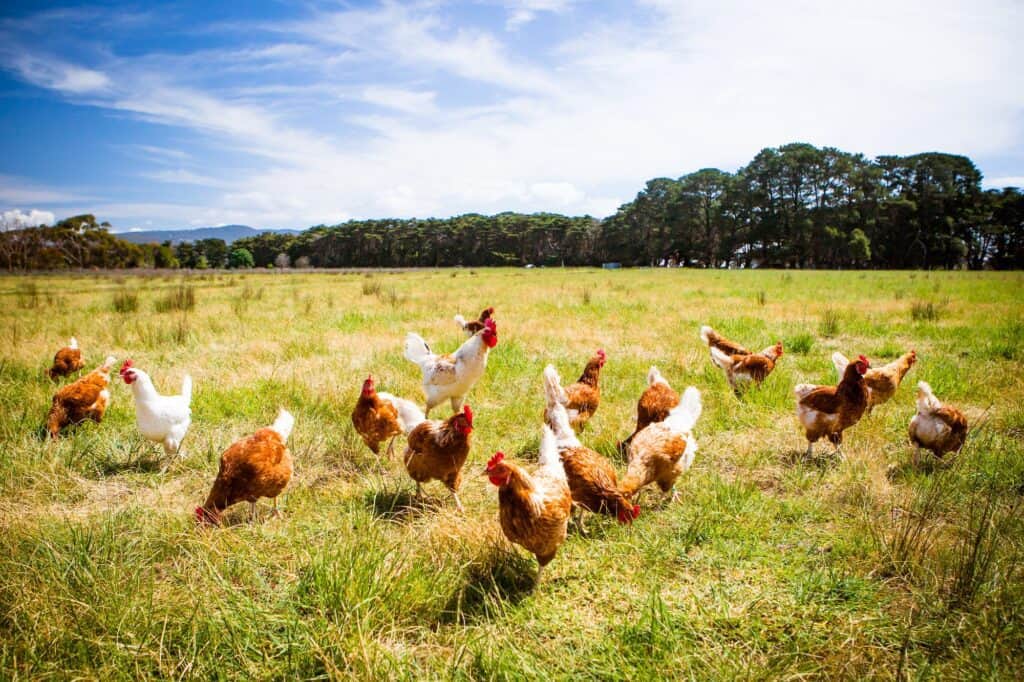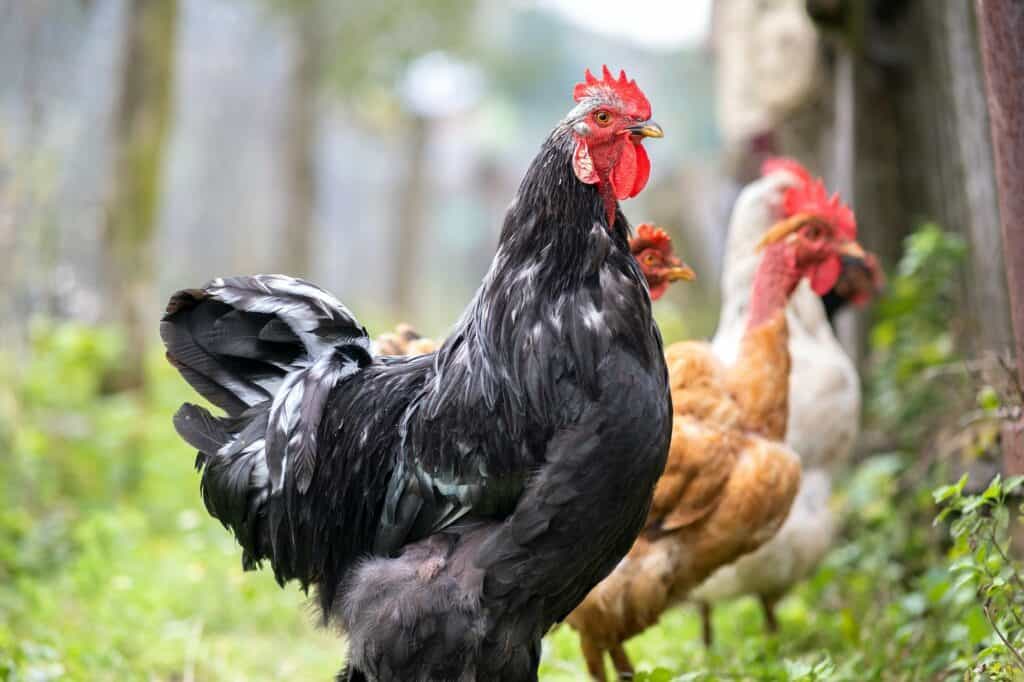When it comes to raising chickens, there are various methods and practices to choose from. One popular and increasingly preferred approach is raising chickens on pasture. Pasture-raised chickens have access to fresh air, open fields, and a more natural environment. This article will delve into the topic of what do pasture-raised chickens eat, exploring their diet, the benefits of pasture-raising, and the impact on the quality of meat and eggs.

Understanding Pasture-Raised Chickens
What is Pasture-Raised Chicken?
Pasture-raised chickens are birds that are raised in a natural environment where they can freely roam and forage for their food. These chickens have access to open fields, fresh air, and sunshine, allowing them to engage in natural behaviors such as dust bathing, searching for insects, and preening. This natural lifestyle contributes to healthier and tastier meat.
Differentiating Pasture-Raised and Free-Range Chicken
While the terms “pasture-raised” and “free-range” are often used interchangeably, there is a distinction between the two. Free-range chickens are given access to the outdoors, but this doesn’t necessarily imply access to pastures. In contrast, pasture-raised chickens are raised on actual pastures, allowing them to forage for grass, insects, and other natural food sources.
Our chickens are pasture-raised. They go back to their coop each night and e close them up for their safety at dusk. We reopen the coop at sunrise and they spend all day in the pasture.
Benefits of Pasture-Raised Chickens
Pasture-raised chickens offer numerous benefits, both for the welfare of the chickens themselves and for the consumers who enjoy their meat and eggs.
Healthier and Safer Meat
Research has shown that pasture-raised chickens have higher levels of beneficial nutrients such as omega-3 fatty acids, vitamin E, and beta-carotene compared to conventionally raised chickens. These chickens also tend to have lower levels of saturated fat. The natural, stress-free environment in which pasture-raised chickens are raised contributes to the production of healthier and safer meat.
Improved Egg Quality
Pasture-raised chickens also produce eggs of higher quality. Studies have demonstrated that organic eggs from pasture-raised chickens contain double the level of omega-3 fat, triple the amount of vitamin D, four times more vitamin E, and seven times more beta-carotene compared to conventionally raised chickens. These enhanced nutritional profiles make pasture-raised eggs a healthier choice for consumers.
Humane and Ethical Treatment
One of the key advantages of pasture-raising chickens is providing them with a more humane and ethical treatment. Chickens raised in pastures have the freedom to engage in natural behaviors and exhibit contentment. In contrast, chickens raised in factory farms are often subject to overcrowding, stress, and cruel conditions. By choosing pasture-raised chickens, consumers can support animal welfare and enjoy meat and eggs that are produced in a more ethical manner.

What do Pasture-Raised Chickens Eat?
The diet of pasture-raised chickens consists of a combination of foraged foods and supplemental feed. While chickens have the ability to forage for a portion of their diet, supplemental feed is necessary to ensure their nutritional needs are met.
3.1 Foraged Foods
Pasture-raised chickens have the opportunity to feed on a variety of natural sources found in the pasture. These include:
- Insects: Chickens actively hunt and consume insects, including worms, slugs, and bugs.
- Seeds: Chickens peck and eat seeds they find among the grasses.
- Grasses: Chickens graze on grass and clover, which provides them with fiber and additional nutrients.
- Roots and Vegetation: Chickens dig and peck at roots, extracting nutrients from the soil.
- Fruits and Berries: Some pasture-raised chickens may also consume fruits and berries that are available in the pasture.
It’s important to note that the availability of these foraged foods varies throughout the year, with spring offering the most abundant supply.
Supplemental Feed
To ensure that pasture-raised chickens receive a balanced diet, farmers provide them with supplemental feed. This feed includes a combination of grains, seeds, and nutrient-rich ingredients. Common components of supplemental feed for pasture-raised chickens include:
- Corn: A staple grain in chicken feed, corn provides energy and carbohydrates.
- Soybeans: Soybeans are a valuable source of protein in chicken feed.
- Wheat: Wheat is another grain that contributes to the nutritional content of the feed.
- Vitamins and Minerals: To meet the chickens’ specific dietary requirements, vitamins and minerals are added to the feed.
- Grit: Grit, such as crushed oyster shells, is provided to help chickens with digestion.
The careful balance of foraged foods and supplemental feed ensures that pasture-raised chickens receive a well-rounded and nutritious diet.
Impact on Meat and Egg Quality
The diet of pasture-raised chickens directly influences the quality and nutritional composition of their meat and eggs. Here’s how pasture-raising affects the final products:
Meat Quality
Pasture-raised chickens produce meat of higher quality compared to conventionally raised chickens. The natural diet, exercise, and stress-free environment contribute to the development of leaner, more flavorful meat. Pasture-raised chicken meat is known for its tenderness, juiciness, and enhanced flavor profile.
Egg Quality
The diet of pasture-raised chickens also positively impacts the quality of their eggs. Pasture-raised eggs have been found to contain higher levels of omega-3 fatty acids, vitamins, and antioxidants. These eggs often have vibrant yolks and offer a richer taste compared to eggs from conventionally raised chickens.
Sustainable Farming Practices
Pasture-raising chickens aligns with sustainable farming practices, benefiting both the environment and the farmer. Here are some of the sustainable aspects of raising chickens on pastures:
Efficient Resource Utilization
Pasture-raised chickens help make efficient use of available resources. They forage on grass, insects, and other natural sources, reducing the amount of supplemental feed required. This efficient resource utilization reduces the environmental impact associated with feed production and transportation.
Environmental Benefits
Pasture-raised chickens contribute to a healthier ecosystem. They control insect populations, eat weed seeds, and promote the growth of beneficial plants. Their natural foraging behavior helps prevent soil erosion and improves soil health. Furthermore, pasture-raising chickens eliminates the need for heating or electricity in enclosed spaces, reducing energy consumption.
Comparison with Other Farming Methods
To fully understand the advantages of pasture-raised chickens, it’s important to compare this method with other common farming practices.
Free-Range Chickens
While free-range chickens have access to the outdoors, their environment may not be a pasture. Free-range chickens may have limited opportunities for natural foraging and a less diverse diet compared to pasture-raised chickens.
Cage-Free Chickens
Cage-free chickens are not confined to cages but are still typically raised in indoor barns. They rely heavily on commercial feed and do not have the same level of access to natural foraging as pasture-raised chickens.
Consumer Awareness and Impact
As consumer awareness grows regarding the benefits of pasture-raised chickens, more individuals are choosing to support this farming practice. By opting for pasture-raised meat and eggs, consumers promote animal welfare, enjoy healthier products, and contribute to sustainable agriculture. The demand for pasture-raised chickens encourages farmers to adopt more ethical and environmentally friendly practices.
Conclusion
Pasture-raised chickens have a diverse diet that includes foraged foods and supplemental feed. Their diet, coupled with a natural environment and humane treatment, results in healthier and more flavorful meat and eggs. Pasture-raising chickens aligns with sustainable farming practices and offer numerous benefits for both the chickens and consumers. By choosing pasture-raised options, individuals can support animal welfare, enjoy higher-quality products, and contribute to a more sustainable food system.
Remember, when it comes to what pasture-raised chickens eat, it’s a combination of nature’s offerings and carefully selected supplemental feed that ensures their well-being and the quality of the end products.
Additional Information: The demand for pasture-raised chicken products has been steadily increasing, leading to more farmers adopting this farming practice. Consumers can further support ethical and sustainable farming by purchasing from local farmers or seeking certifications such as “Certified Humane” or “Animal Welfare Approved” when buying pasture-raised chicken products.
Comments are closed.